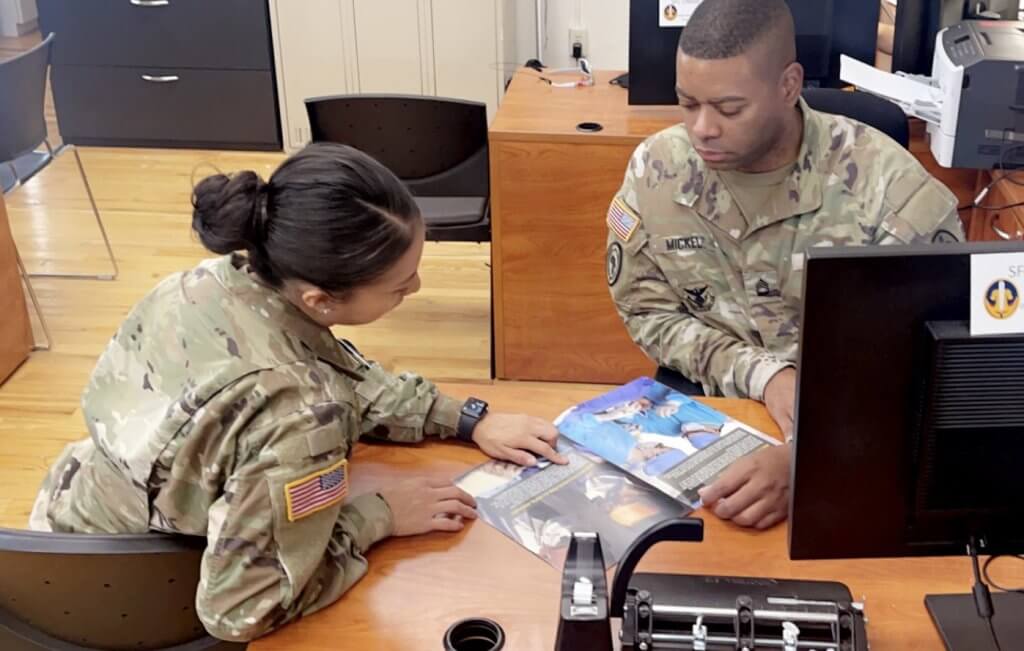It seems contradictory: An Army Reserve career counselor helping soldiers find civilian jobs.
But Sgt. 1st Class Edwin Mickel, of Area 3, Battalion 1, Army Reserve Career Group, which covers the Bronx, Manhattan, Queens and Westchester County, noticed that struggles in his clients’ civilian lives affected their ability to serve.
“We have soldiers living in storage units,” he said, “and they’re expected to come in here on a weekend.”
Last January, he developed a plan to help. Mickel is a member of Mu Beta Phi Military Fraternity Inc., founded in 2017 with a mission of strengthening the veteran community, restoring faith in the larger community and broadening veterans’ knowledge.
He took a plan for an employment and resource referral service to the organization’s president, Navy veteran Jayson Williams, which became the Liberty Work Program.
“As long as it’s logical and makes sense, I’ll green light it,” Williams said. “This is a no-brainer.”
In addition to the career and job placement services, which are boosted by partnerships with Hire Heroes USA and Amazon, the Liberty Work Program helps service members and veterans find benefits and resources, such as assistance getting food, clothing, child care or housing. That’s one reason Mickel and his team are giving the service such a long testing period in the New York and New Jersey area.
RELATED: Technical, trade school certifications make service members ‘more valuable’
“There’s no standard across the country on benefits,” Mickel said. “It’s state by state, county by county.”
Another reason to test the strategy on his home turf is the several veteran service organizations, such as Wounded Warrior Project and Iraq and Afghanistan Veterans of America, in New York City.
“This is where the checks get signed,” he said.
Mickel has used his background in civil affairs and undergraduate studies in leadership to make connections with those other organizations through networking, and is already building templates to help other Mu Beta Phi chapters get off the ground when the time is right.
“I believe patience is a virtue,” Williams said. “It’s not happening as fast as they want to be. But I know it’s good that they’ve taken steps and made adjustments and are continuing to develop the program in the right way.”
Membership in Mu Beta Phi isn’t required to receive services from the Liberty Work Program; Mickel said they’re ready to assist service members, their families, and even civilians when appropriate.
One client, Pfc. Ricardo Flores, reached out to Mickel after separating from the reserves. They had met while serving in the 411th Civil Affairs Battalion, based in Danbury, Connecticut.
Flores left the Army Reserve after six years to address mental health issues, but in the year he was out he lost his job. He recently rejoined, this time assigned to the 237th Support Maintenance Company out of Queens, New York, with hopes of going active duty in a year and reclassifying in military intelligence.
To prepare, he’s taking information technology certification courses either for free or with vouchers provided by Liberty Work Program partners.
To ensure he lands a job after finishing those classes, Flores received assistance in better translating his military experience on his résumé and setting up a LinkedIn account. The program also introduced him to someone in IT for a coaching session.
“Just getting help increased my morale,” Flores said. “Definitely better having a support system.”
Mickel said he’s looking forward to rolling out the program in military-heavy states like Texas and California, where clients might not be able to get to a VA or vet center easily. But above all, he wants service members to get the resources they need to stay in uniform as long as they want.
“We can better assist our soldiers while they’re still serving,” he said.

